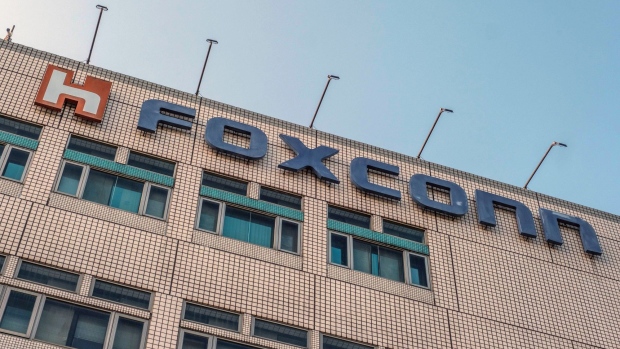Dec 15, 2022
Foxconn Ends Most ‘Closed-Loop’ Restrictions in IPhone City
, Bloomberg News

(Bloomberg) -- Foxconn Technology Group, the primary assembler of iPhones for Apple Inc., is easing most anti-Covid restrictions at its factory in Zhengzhou, China — a facility that had become a flashpoint in the country’s efforts to contain infections.
Foxconn, also known as Hon Hai Precision Industry Co., said it is ending its “point-to-point” system, in which employees had to restrict daily movements to between their dormitories and the campus, according to a statement on its official WeChat account Wednesday night.
China has been moving away from its long-standing Covid Zero approach, which had hurt economic activity and sparked widespread discontent. Foxconn’s move comes after local authorities lifted the “high-risk Covid” status on the area around the plant earlier this week. Zhengzhou had already relaxed its virus-elimination measures for most of the city, ending mandatory Covid testing to enter public areas.
China Eases Curbs in Major Shift From Covid Zero Policy (3)
China’s government is easing restrictions despite climbing infections and relatively low vaccination rates among the elderly. Almost 1 million people in China may die from Covid-19 as the government rapidly abandons pandemic curbs, according to a new study by researchers in Hong Kong.
“Foxconn will now need to address the potential increase in sickened staff and a possible shortage of workers,” said Will Wong, senior research manager at IDC. Many workers may be afraid to leave their homes ahead of family gatherings during Chinese New Year next month, he said. “More initiatives will need to be taken to appease staff, other than financial compensation.”
Foxconn also said it’s reopened its on-site cafeterias and will no longer provide three free meals per day. The lack of access to cafeterias in what’s known as iPhone City had become a significant hurdle to keeping workers fed during the pandemic, sparking an exodus of thousands of employees.
Restrictions at the Zhengzhou campus had reverberated throughout the country and beyond. Foxconn first shut its cafeterias and limited workers’ movements in October, attempting to limit an outbreak of Covid infections. That led to food shortages and trash-filled facilities, prompting workers to depart Zhengzhou by the thousands.
After Foxconn teamed up with local authorities to hire new staff, the workers revolted in November over compensation and safety practices. Violent protests broke out as hundreds of workers clashed with security personnel.
Apple and Hon Hai warned that they would lose iPhone production because of the troubles in Zhengzhou, which makes all of Apple’s high-end Pro models. The shortfall is likely to be close to 6 million iPhone Pro units, Bloomberg News reported in November.
Meal expenses will now be deducted from staff wages, the company said, adding that it will provide 15 yuan per day of subsidies from Dec. 16 to Dec. 31 to those who work regularly.
The company will continue to provide free meals to Covid patients who choose to stay at company-appointed accommodations, it added.
--With assistance from Gao Yuan.
(Updates with analyst comment in fifth paragraph)
©2022 Bloomberg L.P.





